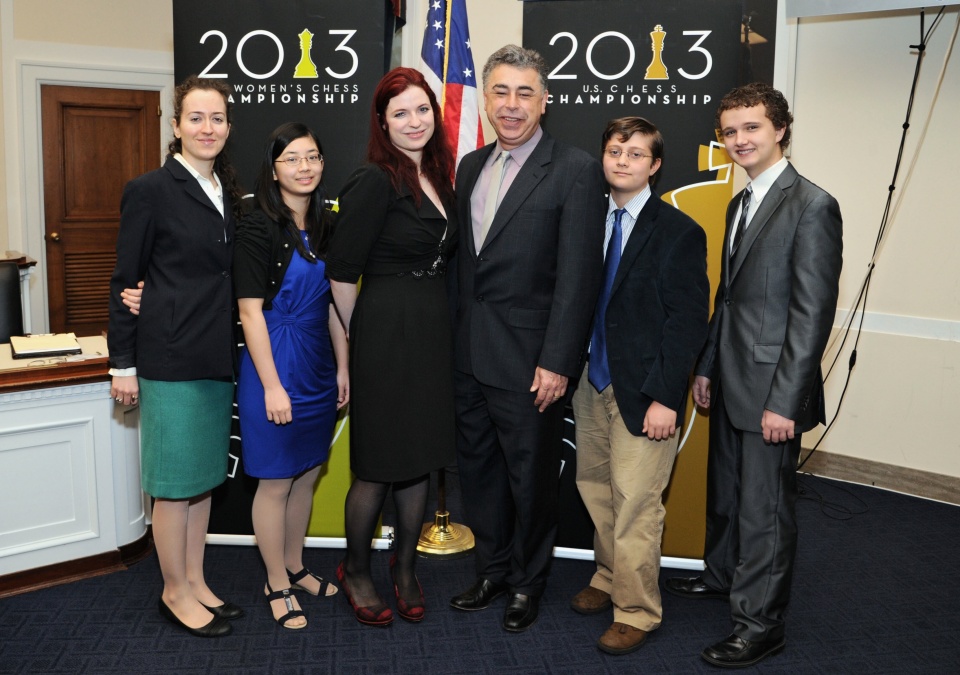2012 U.S. Championships News
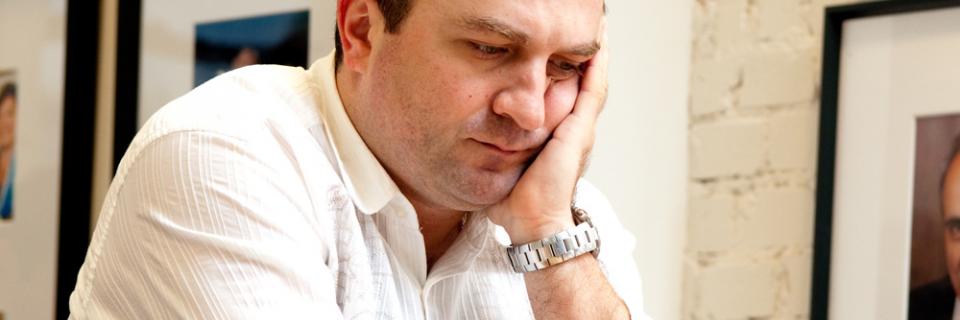 GM Melikset Khachiyan has recently picked up a spate of rating points to earn a wildcard bid to the 2013 U.S. Championship.
GM Melikset Khachiyan has recently picked up a spate of rating points to earn a wildcard bid to the 2013 U.S. Championship.
By Brian Jerauld
Who helped you prepare for the 2013 U.S. Championships? Could you explain how you use that help in your preparation?
No one helped me prepare for the U.S. Championship; I'm preparing by myself. It's all about going over the games of my opponents and my games with the help of a computer.
Have computers changed your understanding of the game? If so, what adjustments have you made?
Computers have indeed changed the way I prepare, searching for more truth in chess. And obviously today almost every GM needs a strong computer to help, but it's doesn't really affect [a player's] style or anything.
You have recently gained many rating points, from 2534 last October to as high as 2625 this March! What is your secret?
It's all about motivation. Just one day (a special thanks to my students for pushing me), I realized that ... I just wanted to get back to 2600, without even thinking about playing in the U.S. Championship. I just wanted to prove to myself that I can still do this, that I can compete at a high level. When you play every game full of energy and concentration, then you have a chance to play better and get some good results. And after one of my good events in San Diego, I realized I might have a chance to compete at the U.S. Championship, and that gave me extra motivation as well.
How could chess in the United States be improved?
Chess needs to be more popular. Chess in Schools programs will help continue to improve the situation all around the U.S., but we are doing great now. Look at our growing generation: Kayden Troff and Sam Sevian. It means we are on the right track!
The Veresov has been regarded by some as “incorrect,” yet you still play the opening despite its bad reputation. Do you know something other GMs do not?
The Veresov is risky opening, and I use it mostly in speed chess, or sometimes in Swiss tournaments against weaker opponents to surprise them. But it is an incorect opening. Besides me? I dont' think so! I'm probably most famous one. Haha!
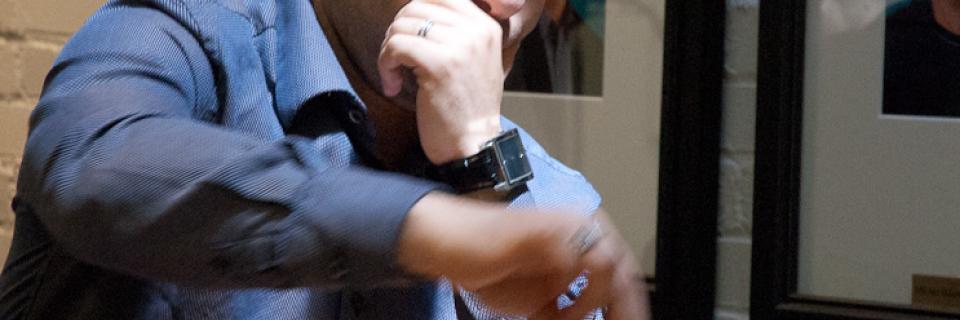 GM Varuzhan Akobian spent the past month serving as the CCSCSL's Resident Grandmaster.
GM Varuzhan Akobian spent the past month serving as the CCSCSL's Resident Grandmaster.
By Brian Jerauld
You just finished a stint as the Resident Grandmaster at the Chess Club and Scholastic Center of Saint Louis – also the venue of the 2013 U.S. Championships. Does your familiarity give you any “home court advantage” over the rest of the field?
I am not sure about having "home-court advantage," but I will be more familiar with the Club and my surroundings. I hope to feel more comfortable during the tournament!
You were featured on MTV’s True Life in an episode titled “I’m a Genius.” Even more recent, you were the cover story of Chess Life (Mar. 2013). Some superstars thrive in the spotlight, others prefer to stay away from center stage .. how do you handle the fame?
I try to be as natural as I can ... It doesn't matter I am in front of a camera or not. I think if a chess player can bring (media) attention on TV or magazines that it will be great for the popularization of chess in general.
FOX Sports Midwest is covering this year’s tournament. What do you think it will take for America to embrace chess like it does with other niche or even mainstream sports?
I think with good marketing and commentators who can explain to the audience simple and clear way, chess can definitely be on TV, like poker for example.
Chess has taken you to some great locations, all over the world. But now you live in Kansas. Is chess the most fun thing to do in Kansas?
Not really, but Topeka is a small and relaxing place to live compared to LA where I lived for 11 years.
You had a fantastic 2012 season in the U.S. Chess League, where you played to a 2748 performance rating and led the Seattle Sluggers to a 5-1 record in matches in which you played. What kind of differences do you see between the USCL and professional, over-the-board chess? Do you put an equal amount of emphasis and value on each?
I take each USCL game very seriously like it's a real over-the-board tournament game, and I spend hours sometimes to prepare for each opponet. It's a little bit different feeling when you play online since you don't see your opponents, but at the crucial moments you can feel how competitive each team is.
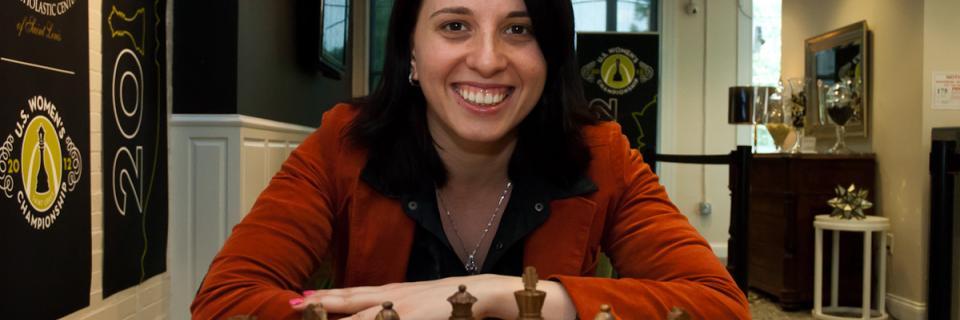 Iryna Zenyuk balances chess with a rigorous academic life.
Iryna Zenyuk balances chess with a rigorous academic life.
By Brian Jerauld
As we lead up to the 2013 U.S. Championships, we'll be running a series of question-and-answer pieces designed to get you better acquainted with this year's field. Introducing: WIM Iryna Zenyuk.
You mentioned how the Internet has democratized chess by making game databases easily available. You also take lessons from your coach in the Ukraine over Skype. What are your thoughts on how technology is changing the way chess is played today?
The chess culture is changing where technology plays a big role by bringing the quality of chess to a whole new level. I remember discussing board games with bridge players at the 1st World Mind Games a few years ago whose main argument to why bridge is superior to chess was that engines can never solve bridge as there is human element to it. I think of branching of chess variations in a typical game as being fractal (i.e. self-similar) and resembling natural systems such as snowflakes, trees and coastlines. Like these natural systems chess is extremely complex in its design and solving it by brute force will require not only quantum computing but also brilliant minds. Thus, I am not too worried about technology drastically changing the way chess is played today, but it does have profound impact on culture, training and preparation we see nowadays. Overall, with computer engines and training tools available we see more players becoming very good at a very young age. Clearly, geography becomes less of a factor with a current No. 1 chess player and World Championship runner-up, Magnus Carlsen being one example, from Norway, which is not on the list of top-10 chess countries. But these are positive things, and I am happy to be part of the era where these changes are taking place!
Do you think the easy access to chess will help see greater representation by countries who have otherwise gone unrepresented?
I definitely hope so. Let me give you one example. Over spring break I went on a University trip to a children's home Urukundo in Rwanda. I met many wonderful people and absolutely loved the local hospitality of this Central African country. Anywhere I went there was always someone who wanted to play a friendly chess game. For example, when visiting the CMU campus there, a local student challenged me to a match, and I was very surprised when he pulled out a tournament chess set from his back-pack. He played fast, confident chess and knew his openings well, and this was no accident as nowadays you can improve your game from the Internet. Surely, there is more to it than getting access to information; there has to be some kind of chess infrastructure built: chess in schools, in everyday life, access to tournaments, parents encouragement etc. but this is as good as an early step can be. If people like playing chess and are willing to spend their time on the game then with Internet and access to chess information we will surely see chess being less geographically polarized and see more stories of chess changing people's lives and open not-thought of before opportunities and make the world a friendlier place.
Many players balance chess with professional jobs or higher education. But you’re balancing the highest level of chess with the highest level of schooling – a doctorate program at Carnegie Mellon University. How do you prioritize between finals and the national championship?
The U.S. Women's Championship is the event of the year for me, so I try my best to prepare well for it. Many of my friends and family are rooting for me and this adds responsibility as well as motivates me to do well. My responsibility as a fourth year PhD student in the lab is mostly research, so finals do not burden my chess preparation as I haven't been taking any classes in the past two years or so.
Your hope is to advance renewable energy technology through your work in mechanical engineering. You mentioned chess is your passion, but engineering is how you see yourself giving back to society. Does that mean chess is nearing its endgame in your life?
Chess has always been a big part of my life, and it might not be the top priority now or in the future, but I believe one can always find time for something that one likes doing. Also, I am very passionate about the research I am doing in electrochemistry and energy storing devices and am planning to remain in academia - eventually getting a tenure-track faculty position, which is extremely competitive and requires a high degree of dedication. Academic research and chess are very similar if one comes to compare them. They both are intellectually stimulating and competitive. To become good in either endeavor one needs to spend thousands of hours in deliberate practice. What I really like about chess and academia careers as there are objective factors to determine your rank, in chess being rating and in academia being your publications. Both activities take place in relatively small communities; it is almost like being a part of a big family. Most importantly, the two fields are all about solving problems, and it is no surprise that I really enjoy both.
Beyond chess and renewable energy, how many more hours do you have left in the day? What do you do with them?
There are rhythms to a working life. Certain months and weeks are filled with high-priority research tasks, weekends included, then I reluctantly occupy myself with any distractions, as these are very productive times. When I am not in deep-work mode or not at chess tournaments there is time for reflection, physical activity such as intramural volleyball leagues and dance classes, social life, TV, cooking and studying the Mandarin language.
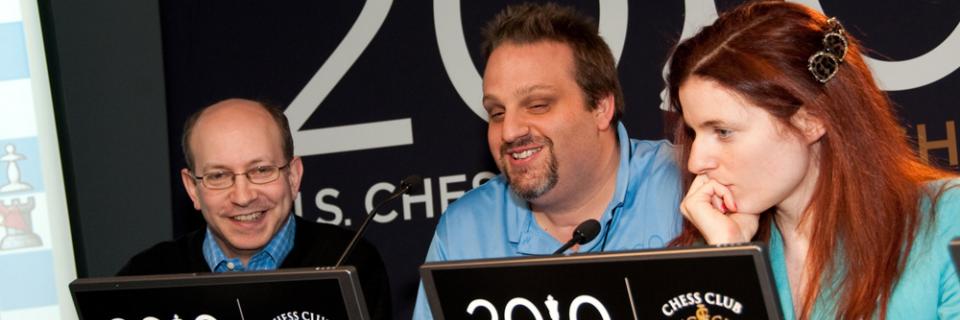 GM Joel Benjamin and GM Ben Finegold analyze their game at the 2010 U.S. Championship with WGM Jennifer Shahade.
GM Joel Benjamin and GM Ben Finegold analyze their game at the 2010 U.S. Championship with WGM Jennifer Shahade.
By Brian Jerauld
As we lead up to the 2013 U.S. Championships, we'll be running a series of question-and-answer pieces designed to get you better acquainted with this year's field. Today, it's all about the Benjamins: Joel Benjamin and Ben Finegold.
Q&A with Grandmaster Joel Benjamin
You have always been clutch on the biggest of stages, including wins of the U.S Junior Championships twice (1980, 1982) and the U.S. Championship three times (1987, 1997, 2000). Does your secret come from behind-the-scenes preparation or performance under pressure?
I really don't consider myself a clutch player at all. For all those successes, there were lots of bitter defeats, too. I've come to realize not every story has a happy ending. The key is to block out the context and focus on the moves.
You were hired by IBM to help design Deep Blue, the first chess program to defeat World Champion Garry Kasparov in 1997. How was that entire experience, and how does it feel to know you helped the machines win?
Machines? I worked on a machine with a bunch of other people (cool and admirable people at that). I always thought the Man vs. Machine stuff was hyperbole. You want that, watch the Terminator. Deep Blue was a chance to work on a unique project and test my ideas and skills against the best player in the world. It was an awesome experience, and it felt great to win. It's just a shame Kasparov was such a sore loser; that sapped some of the pleasure out of it.
How did it feel to have broken Bobby Fischer’s record as the youngest-ever U.S. master and what did the title mean to you over your career? What was it like seeing your own record broken, first by Stuart Rachels and now held by Awonder Liang?
It was quite an honor, especially since the record belonged to Fischer, and it was only a few years after he won the title. But records are made to be broken, and I didn't miss this one when it was gone.
You were inducted into the World Chess Hall of Fame on May 2, 2008. Where does an achievement like that rank in your career? The WCHOF has since been relocated right across the street from the 2013 U.S. Championships in St. Louis. Will have you have time to stop in and look for your name?
To make the Hall of Fame is the ultimate vindication of everything a player has gone through in a career. I'm very proud of that honor. I was inducted at the Hall when it was still in Florida, and got to see my exhibit there. But I haven't been to the new museum yet and look forward to checking it out when I'm in town.
To put it mildly, you have had an amazing career. Can you pick a high point?
It's been a terrific journey. I'm proudest of my success against my friends and colleagues in winning three U.S. championships, and my strong results alongside them in several Olympiads and World Team Championships. If I had to narrow it down, I would say the 1997 title because I had thought my career might be over, and the two gold medals in the 1993 World Team Championship.
Q&A with Grandmaster Ben (Benjamin) Finegold
You were the Resident GM at the Chess Club and Scholastic Center of Saint Louis for three years until 2012, and you are still, at the very least, a regular face there. Do you feel any “home-court advantage” for the 2013 U.S. Championship?
Yes. I think it is helpful that I can stay at my home and that I am more familiar with the Chess Club and the surrounding area.
Have you had any special preparation for the 2013 U.S. Championships? You recently tied for first in the Saint Louis Open, in early April. Is it safe to say you are headed into the Championships “hot?”
I am trying to lose weight and do easy tactical puzzles on the internet. I have lost 34 pounds in the last 7 months, but I need to lose a lot more. Nothing really special. Once I know my opponent and color each day, I will likely do 4-6 hours of prep per game, which is normal. I don't believe in "hot," I just believe in good moves. I will try to play well.
Your father, Ronald; your brother, Mark; and your son, Spencer, have all been USCF masters at one point in their lives. How often do you remind the three of them that you are a GM? What are your thoughts on genetics and chess?
I think we are all happy I became a GM. Genetics? Meh ... I think it is mainly nurture. I was brought up in a chess family. I liked chess a lot as a kid, and the reason I am higher ranked than my brother is that he stopped playing. I think if you love the game, and play a lot, and try hard to improve, that trumps genetics. If you don't agree we can bet $1.
At what point of your life did you realize you wanted to take chess to a professional level? What happened after that moment? How did your approach change?
I think even at a quite young age I wanted to be a chess player. I was not very good until I was 10. I played a lot of tournaments from ages 6-9, but not too successfully. Then, at ages 10-14, I really started to improve. So, maybe at age 10-12 was when I seriously thought about being a chess player. I don't think I had a new approach, as Bobby famously said, "I just got good."
You lived in Belgium for many years. Do you think chess is bigger in Europe, or other parts of the world, than it is in America? If so, what will it take for the U.S. to catch up to speed?
Chess is more highly thought of in Europe. More coverage in mainstream TV and newspapers, magazines, etc. Of course, the CCSCSL is doing all it can to change the chess perception in America. I think two things can help American Chess. 1) An American World Champion 2) Huge corporate sponsorship of top-level events. Will either happen soon? Maybe not, but maybe over the next 15-20 years, both will happen!
 GM Ben Finegold is getting hot at the right time, scoring a T-1st place finish against strong competition at the Bill Wright Saint Louis Open.
GM Ben Finegold is getting hot at the right time, scoring a T-1st place finish against strong competition at the Bill Wright Saint Louis Open.
By Kostya Kavutskiy
Although the Chess Club and Scholastic Center of Saint Louis is only a few years old, its walls are already filled with prestige and history. The 2013 Bill Wright Saint Louis Open took place April 12-14 giving players a chance to play in the same venue that has hosted the last few U.S. Championships, as well as other notable events. The overall turnout was about 80 players, split evenly among the open and reserve sections. As always, the conditions at the CCSCSL were ideal-they provided boards, clocks, and all the rounds started promptly on time.
The event was populated by regular members of the club and players from out of state, as well as quite a few college players, who represented the chess teams from local universities Webster and Lindenwood. Seven out of eight GMs playing the event came from the star studded Webster University, broadcasting one of the major benefits of the growing college chess scene in the United States.
Tying for first and winning the tournament with 4/5 points were GM Wesley So, GM Georg Meier, GM Manuel Leon Hoyos, and GM Ben Finegold (EDITOR's NOTE: GM Finegold will be participating in the upcoming 2013 U.S. Championship held in Saint Louis May 2-13).
In round three, GM Finegold found a winning sacrifice against GM Corrales Jimenez in what he called "one of his best games ever":
Heading into the last round, the four leaders (So, Meier, Hoyos, and Finegold) were all tied for first with 3.5/4. They each drew their respective games, albeit not without a fight, while last round match-ups Boros - Corrales and Bregadze - Bykhovsky were also drawn, leaving a four way tie at the top. I also had a chance to sneak into a share for first place, but that would have required a last round win over GM Diamant, a challenge I wasn't quite up for.
Earning 5th place in the Open were GM Fidel Corrales Jimenez, GM Anatoly Bykhovsky, GM Denes Boros, GM Andre Diamant, IM Vitaly Neimer, and IM Levan Bregadze, all with a score of 3.5/5. The U2300 prize was split between NM Nolan Hendrickson, FM Doug Eckert, NM Spencer Finegold, and Isaiah Gadson, who each scored 3/5 points. Lastly, winning the U2100 prize were Matthew Larson, Zach Stuart, and Tian Lu Peng.
The U2000 section was won by Spencer George Lehmann, who scored 4.5 points. Tying for 2nd were Matt Barrett, Albert Damont Howlett, Vanita Young, and Justin Gm Hull, all with 4/5. The U1800 prize was shared by Julian Proleiko and Joseph Michael Bean, while the U1600 prize was split by Clark Zhang Berry and Richard Berry. Finally, the U1400 prize was hotly contested and won by Bruce Potratz, Ken West, Josh Cardenas, Akshay Srinivasan, and Timothy Paul Baur.
There were also upset prizes, awarded to the winner of the first upset in each section. These were $25 apiece and offered by QuantumGambitz.com. In the open section Matthew Larson won the prize for his win over NM Ruifeng Li, while Paul Goddard earned the prize in the reserve section by beating Barry Manthe, the number one seed.
For full standings of the Bill Wright Saint Louis Open, check out the MSA report here, and if you're ever in the Saint Louis area, make sure to stop by the club http://saintlouischessclub.org and see for yourself what all the fuss and attention is all about! And be sure to follow uschesschamps.com for news on the 2013 U.S. Championship, starting on May 3 at the Saint Louis Chess Club.
Representatives from the upcoming U.S. Championships gathered in Washington D.C. to introduce a resolution naming Saint Louis the nation's Chess Capital. Pictured are Irina Krush, Sarah Chiang, Jennifer Shahade,Yasser Seirawan, Sam Sevian and Kayden Troff.
WASHINGTON, D.C., April 18, 2013 – Representatives William “Lacy” Clay (D-MO) and Blaine Luetkemeyer (R-MO) and Senators Claire McCaskill (D-MO) and Roy Blunt (R-MO) introduced resolutions in the U.S. House and Senate today recognizing Saint Louis as the Nation’s Chess Capital. The resolutions also recognized the success of chess after-school programs and the benefit for students, including fostering problem-solving skills, and improving math and reading test scores.
“Saint Louis is definitely America’s Chess Capital. I’m very proud to have both Webster University’s national champion chess team and the Chess Club and Scholastic Center of Saint Louis in my congressional district,” said Representative William “Lacy” Clay (D-MO). “I thank my Missouri congressional colleagues for joining me in introducing this bipartisan resolution.”
“Chess provides our young people with the kind of reasoning skills they need in an ever-complicated world, and I am proud to have the opportunity in Congress to support Saint Louis’ designation as our nation’s chess capital,” said Representative Blaine Luetkemeyer (R-MO). “This resolution is also an opportunity to recognize the region’s ongoing commitment to the development of our young people’s minds and spirits.”
“Excellence in this game requires the combination of creativity and intellect—skills our Saint Louis students are most certainly known for,” said Senator Claire McCaskill. “Making Saint Louis the nation’s chess capital would rightly highlight our state’s commitment to strong education, and our nation’s brightest young minds.”
“Chess is a way to promote problem solving, critical thinking, and self-esteem, which are important to the development and education of our nation’s young minds,” Representative Blunt said. “I’m proud to recognize Saint Louis as the ‘National Chess Capital’ and to applaud the success of our local chess scholars. I’ll continue to support chess programs in our schools and community centers in Missouri and nationwide.”
The introduction of the bipartisan, bicameral resolutions were announced during a morning reception on Capitol Hill where GM Yasser Seirawan, IM Irina Krush, WGM Jennifer Shahade, IM Kayden Troff, IM-elect Sam Sevian and WFM Sarah Chiang gave chess lessons to Members of Congress and their staff.
“We appreciate the leadership of Representatives Clay and Luetkemeyer and Senators McCaskill and Blunt recognizing Saint Louis as the nation’s chess capital,” said Tony Rich, executive director of the Chess Club and Scholastic Center of Saint Louis. “Their commitment to expanding the successful chess after-school programs is a tremendous example of how our nation can come together on a bipartisan basis to help our students.”
Also in attendance were students who have benefited from chess after-school programs led by the Chess Club and Scholastic Center of Saint Louis. These students played chess with Members of Congress and shared their personal stories of the educational benefits of chess.
Saint Louis, Mo., will host the 2013 U.S. and Women’s Chess Championships May 2-13, 2013 at the Chess Club and Scholastic Center of Saint Louis, the fifth consecutive year the nation’s top players have come to Missouri to compete in the national championship.

